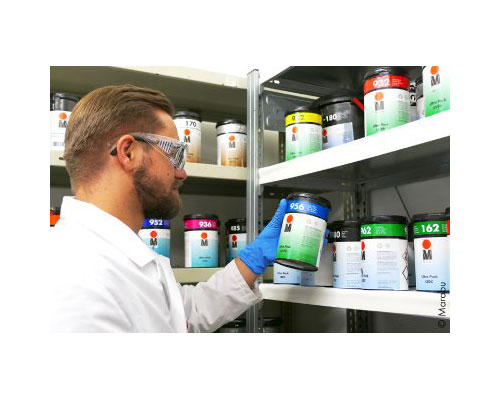Marabu will be at K 2022 (Stand 4C63-1) to explain why GMP compliance is so important for inks that come into indirect contact with food, demonstrate how LED-curable screen printing inks on packaging can save energy and reduce CO2 emissions, and present new screen printing and pad printing inks for the plastics and automotive industries.
GMP-compliant inks for safe food packaging
Food safety is an increasingly important aspect of food packaging. Consumers want to be sure that they aren’t risking contamination from a plastic water bottle or the coating inside a lunchbox. That is why inks for food packaging are subject to strict quality audits to ensure that they are not susceptible to migration. This includes compliance with the EU’s good manufacturing practice (GMP). Marabu’s Ultra Pack UVFP screen printing ink is GMP-certified and approved for use on migration-sensitive PE/PP plastics. These are the most commonly used materials for food packaging and can be found in packaging films, plastic tubes, bottles and the lining in cartons.
 The solvent-based pad printing ink Tampa® Tex TPX is also ideal for indirect contact with food and can be used on bottle caps, condiment bottles and lunchboxes. It will receive GMP certification later this year. However, compliant ink, substrates and processing conditions are only one aspect of food safety. Ultimately, the manufacturer bears responsibility for providing safe products and packaging, and consumers should expect nothing less.
The solvent-based pad printing ink Tampa® Tex TPX is also ideal for indirect contact with food and can be used on bottle caps, condiment bottles and lunchboxes. It will receive GMP certification later this year. However, compliant ink, substrates and processing conditions are only one aspect of food safety. Ultimately, the manufacturer bears responsibility for providing safe products and packaging, and consumers should expect nothing less.
Energy-saving UV-LED curing for packaging with a small carbon footprint
Printing on packaging can be more energy efficient with UV-LED-curable inks. Marabu is an industry leader in LED technology and is committed to promoting environmentally friendly processes among manufacturers and printers. Used in combination with LED-curable ink systems, such as the Ultra Pack LEDC, UV-LED curing offers many advantages over traditional UV curing. For example, UV-LED lamps require no warm-up time and do not generate heat. This reduces their energy consumption and means that substrates, such as cosmetic tubes, are not subjected to potentially harmful temperatures during printing. UV-LED lamps furthermore use only UV-A light, which means they do not generate any ozone and do not require extraction systems. They also have a very long service life. With the right ink system and industry partner, switching to UV-LED technology is a good investment for everyone’s future.
New screen printing ink for film insert moulding (FIM)
Mara® Mold MPX was specifically developed to be used in film insert moulding (FIM) processes on polycarbonate (PC) films. It is easy to shape, can withstand high temperatures and adheres well to injection-moulded substrates. The range is ideal for all sorts of designs and includes a non-conductive opaque black and various effects. Shaped FIM components are used in the automotive sector, as control panels for household appliances or consumer electronics, and in medical devices. Marabu’s new in-house FIM plant (equipped with high pressure forming technology from Niebling) means the company can ramp up development and address specific customer requirements in the shortest possible time.
Water-based pad printing inks
Maqua® Pad MAP is the world’s first water-based pad printing ink. It is ideal for printing on sensitive products such as toys, FFP2 masks and textiles that come into direct contact with skin. The ink is very safe to use and is as good as odourless thanks to its water-based formula. It contains very low levels of PAH and VOC (volatile organic compounds), and is BPA and BPS free. Careful preparation must be undertaken before switching to water-based pad printing inks, and it is important to find the right room temperature, humidity level, printing machine, pad hardness and cliché type, and to only use limited auxiliary materials. Marabu will also be presenting Maqua® Coat MAF and Maqua® Color MAC, two water-based inks that can be applied using a spray gun or brush. They are particularly suitable for decorating figurines and are easy to use.










